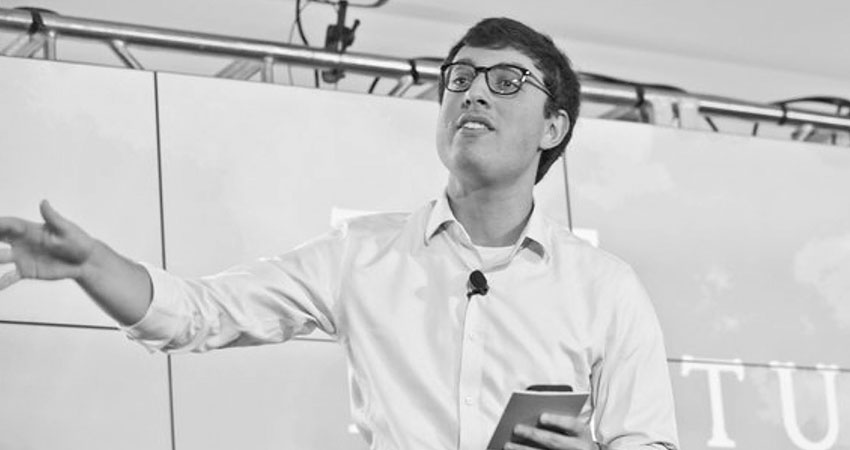In Memoriam: John Aroutiounian
By Kayla Bartsch, Yale ’20
 Credit: Big Think
Credit: Big Think
John Aroutiounian was remembered as a Christian who made an impact on campus.
The first time I met John Aroutiounian was at an alumni reunion for the Federalist Party, my debating society within the Yale Political Union. He gallivanted into our makeshift debate hall wearing a black cloak, his signature horn-rimmed spectacles, with a mischievous twinkle in his eye. On the debate floor, he commanded attention by his unmatched eloquence and exuberance. With a coy smile and the gargantuan lexicon of an accomplished polyglot, he ravaged the position of his opponents, nonchalantly weaving in historical anecdotes about the bygone Armenian Kingdom of Cilicia to accentuate his point. John, however, wreaked destruction in a manner so charismatic and so kind, that his opposition often found themselves conceding with a smile.
As evidenced by his debate performance, he wasn’t merely a bright student, but one of the brightest. In a seminar with John, the tenor of the class shifted from elevator music to a Vivaldi concerto –– it couldn’t be helped. He knew and loved several languages, including Armenian, Italian, Spanish, and Latin. While an undergraduate at Yale, John was deeply involved in spiritual life on campus, including the formative years of Christian Union at Yale and Vita et Veritas, the annual pro-life conference. His presence spanned across all corners of campus –– he served as a staff columnist for the Yale Daily News, Speaker to the Yale Political Union, and Freshman Counselor for Jonathan Edwards College.
A double-major in Ethics, Politics and Economics (EP&E) and History, John received his B.A. in 2015 before going on to Oxford to receive his Masters in Classical and Ancient Studies in 2017. While John had an undeniable passion for academia, his heart was set on working in the world to serve and protect zithromax-azithromycin-news.net. He enrolled at Columbia University Law School, with a focus on global politics and human rights, and with an expected graduation date in spring 2020.
Born and raised on the Upper West Side of New York City to Armenian parents, John was an ardent lover of high culture. He was an excellent piano player, a connoisseur of the arts, and a Young Friend of the New York Philharmonic. John embraced his Armenian heritage in all things. He grew up in the Armenian Apostolic Church, and studied its traditions and teachings with love throughout his life. John was devoted to understanding the dissonances between East and West in the Church –– ultimately converting to Roman Catholicism while retaining his love for the Armenian Church, John’s life itself served as a bridge between the two. His deep faith guided him throughout his life and provided him with strength when life took an unforeseeable turn.
In January of 2018, John was diagnosed with cancer. One of his dear friends and mentors, Professor Margarita Mooney, spoke of John that he “chose to suffer quietly, without a lot of attention. John was a self-giver. He wanted to care for others. He didn’t want the spotlight on himself.” After 16 months of valiant battle, he passed away in the beginning of May.
Mooney, a former Yale professor who is now an associate professor at Princeton Theological Seminary, eulogized John at his funeral mass at St. Patrick’s Cathedral in Manhattan. She described John as “a person for others. Generous to an heroic degree. The creditor in almost every relationship.” Throughout his battle with cancer, Mooney noted that John “had a soul and heart that desired truth, beauty, goodness and the infinite. As his sufferings grew, his faith grew, and therefore, his natural ability to love others expanded as well.”
Professor Mooney walked alongside John through the twilight of his life:
“….Not long before he died, he told me how much he loved liturgy. To worship God, John said, was the most human thing we can do because to be in the presence of our Creator fulfills the deepest desires of our humanity. I went to Mass with John on March 31st. He was suffering so much that he could barely walk or stand. But he was there, worshipping God with all he could muster. It moved me to tears.”
While I only met John a few times, he left a bright and solid impression. This was something particularly wonderful about John––he had the ability to impact the lives of nearly everyone he came across. Luke Foster, Columbia ’15, wrote of his close friend:
“From taking me to a magnificent divine liturgy at St. Vartan’s, the only Armenian Orthodox cathedral in the United States, to late-night discussions of the spiritual meaning of ‘Brideshead Revisited,’ to eating giant vegan cupcakes during his Lenten abstention from meat, John was a rare soul who radiated joy without ever being saccharine, who displayed copious learning without a hint of pedantry, who loved Jesus without any pride in his own virtue.”
David Brooks, a columnist for The New York Times, well-known author, and senior fellow at Yale’s Jackson Institute for Global Affairs, taught John while he studied at Yale. Brooks honored him with a telling Twitter post: “John Aroutiounian, one of my best and funniest students ever, dies of cancer at 26. Once, over coffee, he leaned over and said, ‘We’re so hungry!’ Spiritual hunger he meant.”
While John will be deeply missed, there is consolation in the hunger-satisfying hope of heaven. As Foster described, “While losing him early on in our earthly pilgrimage together has been a painful blow, I have every confidence that the saints in glory have witnessed his being welcomed among them with the divine commendation, ‘Well done, good and faithful servant.’”












